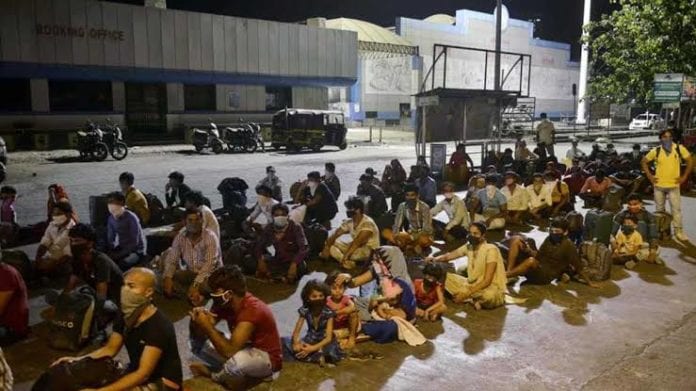Table of Contents
LOCKDOWN 4.0: DIFFERENT RULES AND GUIDELINES
From May 18 India will enter into the fourth phase of lockdown with different guidelines. On Sunday Home Minister issued a different set of rules and guidelines which will be followed during lockdown 4.0. The government allowed several relaxations which include inter-state movement of passenger vehicles and buses. Whereas sports complexes and stadiums, schools, malls, and restaurants would continue to remain shut, and suspension of flight and metro services would stay in force till May 31.
Hotels, restaurants, cinema halls, malls, swimming pools, gyms will also stay shut. The MHA said inter-state movement of passenger vehicles, buses would be permitted with the joint approval of states. The MHA further added that the States and Union Territories have been conveyed the powers for tracing of Red, Green and Orange Zones as per the COVID-19 situation.
Due to the rise in a number of coronavirus cases in India the curfew gets extended for the fourth time. The first assigned for 21 days starting March 25 and then extended from April 15 and May 4.
In India, the total number of coronavirus cases surpassed china’s record as there is a total of 90,927 infections and the death toll soared to 2,872 on Sunday, According to the latest figures provided by the Union Health Ministry.
What are the changes in rules of lockdown 4.0
• Inter-state activity of passenger vehicles and buses, with the joint approval of the state(s)/UT(s) involved. The intra-state activity of passenger vehicles and buses, as concluded by the states and UTs.
• The guidelines have made a significant climb-down on the practice of the Aarogya Setu app. Whereas in the last plan the Centre had made the use of Aarogya Setu app compulsory for employees in an office and put the onus of execution on employers, the new guidelines have asked them to make best efforts in that way.
• During lockdown 4.0 all other shops which are not including in containment zones and malls, will be permitted to open from Monday with staggered timings.
• Sports complexes and stadia permitted to reopen but announced out of bounds for observers.
• E-commerce platforms authorized to deliver non-essential items even in red zones, excluding the containment areas. Exchange of non-essential items by e-commerce companies have already permitted in green and orange zones.
• District authorities have been consulted to instruct individuals to install the Aarogya Setu application on consistent mobile phones and regularly revamp their health status on the app.
• The tracing of Red Green and Orange Zones will be agreed by the respective State and UT Governments, after taking into deliberation the parameters conveyed by the Ministry of Health & Family Welfare.
What is open in lockdown 4.0
• The activity of individuals and vehicles is authorized only for permitted activities, with a maximum of 2 persons (besides the driver) in four-wheeler vehicles, and with no other rider in the case of two-wheelers
• The Industrial institutions in urban areas like Special Economic Zones (SEZs), Export Oriented Units (EOUs), industrial estates, and industrial townships with access control have been licensed.
• Developing units of essential goods which include drugs, pharmaceuticals, medical devices, their raw material, and intermediates; production units, which require continual process, and their supply chain, manufacturing of IT hardware; jute industry with staggered shifts on social distancing and generating units of packaging material
• Formation activities in urban areas have been restricted to in-situ construction (where workers are available on site and no workers are expected to be brought in from outside) and construction of renewable energy programs.
• Shops in urban areas, for non-essential goods, are not permitted in malls, markets, and market complexes.
• All industrial and building activity in rural areas, including MNREGA, works, food-processing units, and brick-kilns are allowed.
• In rural areas, without recognition of the nature of goods, all shops except in shopping malls, are allowed.
• All agricultural actions – sowing, harvesting, procurement, and marketing operations in the agricultural supply chain are allowed.
• Animal husbandry workouts are fully authorized including fisheries
• All plantation activities are permitted, involving their processing and marketing.
• All health services (including AYUSH) are to remain active, containing transport of medical personnel and patients through air ambulances
• The Financial sector continues to open largely. This contains banks, non-banking finance companies, insurance, and capital market activities, and credit co-op societies.
• The Undertaking of homes for children, senior citizens, destitute, women, and widows, etc.
• The operation of anganwadis is allowed.
• Common utilities in power, water, sanitation, waste management, telecommunication, and internet
• Courier and postal assistance are available.
• E-Commerce activities, in the Red Zones, are authorized only in admiration of essential goods
• Private offices can regulate with up to 33% stability as per requirement, with the staying persons working from home
• All the single shops, neighborhood (colony) stores, and shops in residential networks are authorized to remain open in urban areas, without any recognition of essential and non-essential.
• All Government offices shall process with senior officers of the level of Deputy Secretary and above at full strength, and the continuing staff attending up to 33% as per provision. Defense and Security services, Health and Family Welfare, Police, Prisons, Home Guards, Civil Defence, Fire and Emergency Services, Disaster management and related services, National Informatics Centre (NIC), Customs, Food Corporation of India (FCI), National Cadet Corps (NCC), Nehru Yuvak Kendra (NYK) and Municipal services shall operate without any constraints; delivery of public services shall be guaranteed and necessary staff will be deployed for such objective.
• All the activities including print and electronic media, IT and IT-enabled services, data and calcenterses, cold storage and warehousing services, private security and facility management services and services provided by self-employed persons, except for barbers, etc are allowed to work.
• All the Developing units of essential goods which includes drugs, pharmaceuticals, medical devices, their raw material and mediators; production units, which require endless process, and their supply chain are allowed to work.
• Jute industry with staggered shifts and social distancing; and manufacturing of IT hardware and manufacturing units of packaging material will remain to be authorized.
On March 19, Prime Minister Narendra Modi first communicated the nation over India’s coronavirus preparedness. In his speech, he announced a Janta curfew and a nationwide lockdown for 21. He extended the lockdown period till May 3 on April 14 and on April 13 PM Modi requested the nation to light lamps for frontline corona warriors. The Home Ministry further extended the lockdown till May 17.













